Mr. Susskind: A particularly colorful group, often seen dancing and chanting in the major cities of this country—New York and Chicago and Detroit and Pittsburgh—is called the Hare Krsna movement. Because their names are extremely difficult to pronounce, I’m going to ask my guests to introduce themselves. What is your name?
Rupanuga: My name is Rupanuga. Anuga means follower, and Rupa Gosvami is a great acarya or spiritual teacher in our line. So it means I follow Rupa Gosvami.
Mr. Susskind: Right. And yes ma’am?
Kalindi: My name is Kalindi. It’s one of Krsna’s favonte rivers.
Mr. Susskind: Right.
Yogesvara: My name is Yogesvara dasa. That means that I’m the servant of Krsna, who is the master of all mystic powers.
Bharadraja: My name is Bharadraja dasa, and it’s another name of the Supreme Lord, and I’m His servant.
Rukmini: My name is Rukmini.
Mr. Susskind: Rukmini.
Rukmini: I’m a servant of Krsna’s wife, Rukmini.
Mangalamaya: My name is Mangalamaya dasa, and Mangalamaya means full of auspiciousness.
Jayadvaita: My name’s Jayadvaita dasa. Jaya means victory, and Advaita is the devotee who requested the Supreme Lord to come to this world and spread this chanting.
Satsvarupa: My name is Satsvarupa dasa. That means God has an eternal form that doesn’t die, and I’m His servant.
Yogamaya: My name is Yogamaya dasi. Yogamaya is the internal potency of Krsna. Krsna has different energies. The external potency is the inferior energy, and the internal is the superior energy, and that’s yogamaya. And I’m the servant of this potency, of this energy.
Mr. Susskind: You’re the servant of this potency?
Yogamaya: Yes. Krsna displays Himself in different energies, and everything on the absolute platform is equal. It’s all absolute, and it’s all actually spintual. So this is His spintual energy, yogamaya.
Mr. Susskind: Yes, sir.
Bhagavan: My name is Bhagavan dasa. Bhagavan refers to the fact that God is full of opulence, and dasa means servant.
Mr. Susskind: You’re a servant of opulence.
Bhagavan: Servant of one who possesses all opulence.
Mr. Susskind: Right. Now, what instrument do you have there and for what purpose?
Bharadraja: This is called a harmonium, and this instrument is used in kirtana. Kirtana means joyous singing to glorify the Lord.
Mr. Susskind: Right. Let’s see what that’s like.
[Bharadraja leads an ecstatic five-minute kirtana—100 devotees singing and dancing—and ends with the shout “All glories to Srila Prabhupada!” Then the questions resume.]
Mr. Susskind: What is your movement all about? Are you Americans?
Rupanuga: Yes. Born here in the United States. Not all of us were born here in the United States, but most of us.
Mr. Susskind: And you had another religion once? You were Catholic or Protestant?
Rupanuga: Yes.
Mr. Susskind: What made you disillusioned about that religion? What made you come to Krsna?
Rupanuga: Because Krsna gives us a taste that satisfies us. It makes us happy chanting Hare Krsna.
Mr. Susskind: But what does it do in productive terms? I mean you sing and dance in the streets. To what purpose?
Rupanuga: To inform people, to remind people about the Supreme Personality of Godhead, Krsna. In this age everyone is forgetful of God. It’s a godless age, and people come into the material world in the first place to forget God.
Mr. Susskind: Couldn’t you serve God by functioning, by growing crops, by doing something purposeful?
Kalindi: But we are doing something. The root of all problems—the lack of foodstuffs, the war and the strife and the hypocrisy that exist in the world today—is a lack of God consciousness. So simply if you cure the disease in Biafra, then you have a Pakistan. After you have a Pakistan you have something else. So therefore there’s no cure—no material cure—to the problem. The cure is spintual.
Mr. Susskind: What do you stand for? I know you don’t eat meat, fish or eggs. You don’t gamble. You don’t believe in sex, except on a very limited basis. You don’t believe in intoxicants. You don’t take tea or drugs or coffee. What does that add up to? What purposeful—what thing do you produce?
Bharadraja: It purifies us.
Mr. Susskind: But now you’re purified—for what purpose?
Bharadraja: To love Krsna. Because Krsna is the supreme pure.
Mr. Susskind: Couldn’t you love God as a Catholic or a Protestant or a Jew?
Bharadraja: Yes, you can.
Mr. Susskind: But why didn’t you do it in those terms?
Bharadraja: I don’t know. But Krsna has come, and this message of Krsna has come so pure that it is changing the faces of all the youth all over the world.
Mr. Susskind: How did Krsna’s message come to you?
Bharadraja (pointing to a picture of Srila Prabhupada): My spiritual master.
Mr. Susskind: What were you doing when Krsna came to you?
Bharadraja: I was playing harmonica in a blues band. [laughter]
Mr. Susskind: And one night you were playing, and where did Krsna appear?
Bharadraja: I was playing at an opening of a temple. Because I wanted to do some good. We were doing everything for nothing. And so by chance I happened to play for an opening of the temple in Montreal.
Mr. Susskind: A Jewish temple?
Bharadraja: No. Radha-Krsna Temple, universal temple, a temple of love of God. They needed some money in order to help get the place going.
Mr. Susskind: At that time you were Protestant?
Bharadraja: No.
Mr. Susskind: What were you? Atheist?
Bharadraja: Yes.
Mr. Susskind: Atheist.
Bharadraja: And so I played, and they were chanting. They said, “Let’s chant,” and so we chanted.
Mr. Susskind: The way they chanted now?
Bharadraja: Just now, just like that.
Mr. Susskind: Something about that chant, and bliss began?
Bharadraja: I didn’t know at the time, but it stayed with me—for two years.
Mr. Susskind: Why? I watched it, and it seemed like another form of revivalism or something.
Bharadraja: Well, we are reviving.
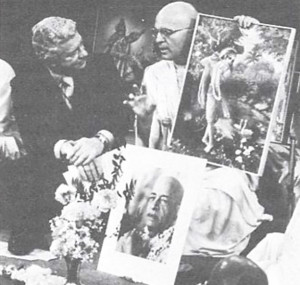 Yogesvara: Yes, that’s a correct description, but it’s not limited in its definition. When we chant Hare Krsna, this is not any kind of an artificial imposition on anyone. By nature we are all spiritual living beings. But because we’ve come in contact with material nature, therefore this original consciousness is covered, and as a result we’re constantly engaged in waging a hard struggle for existence against this material nature. But that original, dormant Krsna or God consciousness can be revived by this chanting of Hare Krsna. This is the recommended means.
Yogesvara: Yes, that’s a correct description, but it’s not limited in its definition. When we chant Hare Krsna, this is not any kind of an artificial imposition on anyone. By nature we are all spiritual living beings. But because we’ve come in contact with material nature, therefore this original consciousness is covered, and as a result we’re constantly engaged in waging a hard struggle for existence against this material nature. But that original, dormant Krsna or God consciousness can be revived by this chanting of Hare Krsna. This is the recommended means.
Mr. Susskind: Why? How?
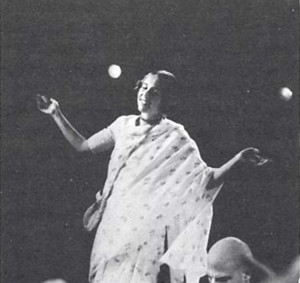 Yogamaya: This chanting is spiritual sound, and because we’re spiritual beings, it’s attractive to our soul as well as to our ear.
Yogamaya: This chanting is spiritual sound, and because we’re spiritual beings, it’s attractive to our soul as well as to our ear.
Mr. Susskind: Do you feel euphoria?
Yogamaya: Oh, yes. It’s called transcendental bliss or transcendental ecstasy.
Mr. Susskind: Were you in bliss? I was watching you.
Yogamaya: Yes. [happy laughter from the audience] This is a much higher ecstasy than any material pleasure that you can experience because it’s ever increasing. It gets nicer all the time. As you chant Hare Krsna, the more you chant, the more you want to chant.
Mr. Susskind: Well, why is that ecstasy-producing?
Yogamaya: Because you’re being put in direct association with God. God is actually present in His name. God incarnates in many, many different forms—millions of different forms. And this is the sound incarnation of God. God invests all of His energies in His name. He’s nondifferent from His name. If we have names … You’re David … If I call you David, you’re different—your body is different from David the person. You’re different from your name. But God is not different from His name. And He’s not imperson. We don’t call Him just “God.” We call Him by His name. Just as we don’t call you “man”—we call you David Susskind or Mr. Susskind. So we call God Krsna because that’s His name. That’s one of His names.
Mr. Susskind: Yet people have called Him Jesus, people have called Him Buddha, people have called Him Mohammed …
Jayadvaita: We’re saying that people should call Him.
Mangalamaya: He has millions of names.
Mr. Susskind: But why couldn’t you call Him through the religions of your birth?
Jayadvaita: You can.
Mr. Susskind: But you didn’t.
Jayadvaita: Right. Because no one’s teaching us to do that.
Mr. Susskind: Didn’t your father and mother teach you?
Jayadvaita: No.
Mr. Susskind: Your priest?
Jayadvaita: No. But we’re preaching that.
Mr. Susskind: Do any of you work?
Jayadvaita: Some of us, yes. We have people who are accountants, we have people who are electrical engineers.
Mr. Susskind: You go to work with this costume?
Jayadvaita: No, no. Most of us don’t go to work. We go out chanting, and we go out preaching to people, “Please don’t forget God. Remember God. Remember your relationship with God. Chant the name of God.”
Bhagavan: That’s an important part of the social body. Just like you have a body, there’s also a social body. The head of that body is considered the priestly class of people, who instruct the others about offering everything back to God. That’s a basic principle of one who is spiritual. He understands that nothing is his. As soon as you claim something is yours—whether it’s your watch or your shoes …
Mr. Susskind: How about your wife?
Bhagavan: Or your wife or your child …
Mr. Susskind: Your wife is not yours?
Bhagavan: She is Krsna’s. I am Krsna’s, and you are Krsna’s.
Mr. Susskind: Is your wife your wife?
Bhagavan: My wife is Krsna’s.
Mr. Susskind: Is your child yours?
Bhagavan: Everything belongs to God. You can’t substantiate your proprietary claim.
Mr. Susskind: Well then what is your relationship to your wife and child?
Bhagavan: We’re all serving Krsna.
Mr. Susskind: What does that mean?
Yogesvara: It’s one of love. But that love is not ill-founded. Krsna’s at the center. Therefore that love endures. I think if you look at the statistics you’ll find that most relationships terminate rather quickly, and even if they’re prolonged, at most they can last until the end of one lifetime.
Rukmini: Actually, love is based on the spirit soul. When someone’s lying dead, his mother’s crying over him, “John is gone, John is gone! My boy is gone!”
So that means she’s loving the spirit.
Yogesvara: The body’s still there, but John is gone.
Mr. Susskind: Well, you marry. You do marry.
Rukmini (pointing to Bharadraja): We’re married.
Mr. Susskind: So you did take one to the other.
Rukmini: But in Krsna consciousness.
Mr. Susskind: What does that mean?
Rukmini: That means that we married in order to better facilitate our serving Krsna.
Bhagavan: That is in everyone’s interest.
Mr. Susskind: Did somebody ordain the marriage?
Bharadraja: Yes, our spiritual master, His Divine Grace A.C. Bhaktivedanta Swami Prabhupada.
[The audience cheers, “Jaya! Jaya!” (“Victory! All glories!”) in appreciation.
Bharadraja: The founder of this movement.
Mr. Susskind: His Holiness ordained your marriage. He called you and said, “I want you to marry this woman.”
Bharadraja: Well …
Rukmini: He said it would be a perfect marriage.
Mr. Susskind: How did he know? Had you ever met?
Bharadraja: We met just a little while before we were married.
Yogesvara: I think what we’re trying to get at is this—that the marriages that are taking place in Krsna consciousness are not based on one’s attraction for the other in terms of common interests or sex life or something like that.
Mr. Susskind: Shouldn’t they be?
Yogesvara: Well, if you want it to be a short relationship, that’s fine.
Rupanuga: Well, we’re all eternal as it is, you see. We all are eternal living beings, spirit souls, and it’s just a temporary body, so we don’t marry for some temporary bodily relationship. We marry to help each other become more Krsna conscious, have more consciousness of God. And then when the body drops, that’s just the beginning, actually. Because we can change from these bodies into another material body, or we can take a spiritual body. It’s not difficult. It depends on what we want.
Yogesvara: If you really love somebody, you’ll help them find out who they are.
Mr. Susskind to Kalindi: You will have a child when he [Rupanuga] “bids you to?
Rukmini: Well, Yogesvara made a very nice point just now—that if you really love someone, then you’ll help him become really happy and find out who he is. Just like you asked at the beginning, “What do your parents think of this?” Well, my parents say they love me, so because they see that I’m becoming very happy, they’re very pleased. Because they know that previously I wasn’t.
Mr. Susskind: But could this be another phase that you’re in?
Rukmini: It could be, but Rupanuga Prabhu has been chanting Hare Krsna for over four years. I’ve been chanting for three and a half years—so many devotees here for such a long time—and we’re feeling rather than some decrease, rather than stagnation—we’re feeling ever-increasing transcendental bliss. Ever-increasing bliss.
Satsvarupa: Please don’t take us as a sect. This applies to everyone, these things we’re talking about.
Mr. Susskind: Why do you paint this thing on the front?
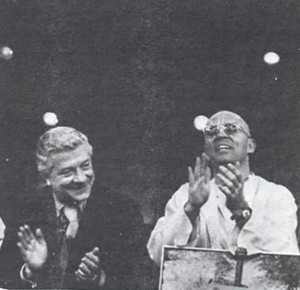 Satsvarupa: Because this marks us as devotees of Krsna The whole thing is to remind our brothers and sisters, just as you are our brother: brotherly love is based on the fact that God is our father. We want to remind everyone of their relationship to the one God. So we’re preachers. This dress, this marking, is all to remind you: “Oh, there goes a Krsna person.” And then he has to think of his own relationship to Krsna or God.
Satsvarupa: Because this marks us as devotees of Krsna The whole thing is to remind our brothers and sisters, just as you are our brother: brotherly love is based on the fact that God is our father. We want to remind everyone of their relationship to the one God. So we’re preachers. This dress, this marking, is all to remind you: “Oh, there goes a Krsna person.” And then he has to think of his own relationship to Krsna or God.
Mr. Susskind: What is the tuft of hair? Each of you has a little …
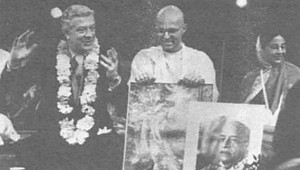 Satsvarupa: Yes. This is called a sikha. This is done for the pleasure of our spiritual master. It’s the same thing. Spiritual markings to make one understand, “Here’s a devotee, and I can ask him about my relationship with God.” Because when one dresses like this it means that twenty-four hours he’s serving Krsna and trying to spread this very nice consciousness.
Satsvarupa: Yes. This is called a sikha. This is done for the pleasure of our spiritual master. It’s the same thing. Spiritual markings to make one understand, “Here’s a devotee, and I can ask him about my relationship with God.” Because when one dresses like this it means that twenty-four hours he’s serving Krsna and trying to spread this very nice consciousness.
Mr. Susskind: Aren’t you over-dressing to explain yourselves to God? I mean, with the little thing of hair and the paint on the front …
Satsvarupa: God? No, He knows very well.
Mr. Susskind: But doesn’t the average civilian walking down the street reading the Daily News or the Chicago Tribune …
Satsvarupa: He doesn’t know about Krsna. What does he see in the Chicago Tribune? Birth, death, disease, old age. Then he looks up, and he sees a devotee, and there’s Krsna. [Audience: “Jaya!”]
Mr. Susskind: Tell me, what’s your day like? When do you get up in the morning?
Rukmini: Very early. I get up at three in the morning.
Mr. Susskind: Why?
Rukmini: Our spiritual master, Srila Prabhupada, instructed us that that’s the best time for self-realization.
Mr. Susskind: Three o’clock in the morning?
Rukmini: Yes.
Bharadraja: Actually, happiness is to be awake. If you’re asleep you’re missing out on so many things.
Mr. Susskind: You get up at three o’clock in the morning. Right. And the whole city is dark. What do you do?
Bharadraja: We chant.
Kalindi: We chant Hare Krsna.
Mr. Susskind: At three o’clock in the morning you chant?
Rukmini: Yes. We have a ceremony called aratrika, which is worshiping the Lord. Aratrika means to receive the Lord. So we all chant at this aratrika ceremony and play nice instruments, like this harmonium and mrdanga (the drum you saw) and nice karatalas. It’s very beautiful, very early in the morning.
Rupanuga: And we study. We study. We have very nice books, literatures, the Krsna Book, the Srimad-Bhagavatam. We study the pastimes of God. This is the specific contribution of our movement—that we are explaining to the world what God looks like, what He’s doing, who His associates are, His clothes …
Mr. Susskind: What does He look like? What does God look like?
Rupanuga: Here’s Krsna here.
[Rupanuga brings forth a picture of Syamasundara, Krsna in His original form.]
Mr. Susskind: With lakes and ducks and …
Yogamaya: That’s the spiritual world. We have descriptions in our literature of the spiritual world.
Mr. Susskind: Right. And who are His associates? Animals and flowers and … ?
Jayadvaita: All of His pure devotees.
Rupanuga: All of His pure devotees. He has a family. You see, everything in this material world is a reflection of the spiritual world. The Supreme Personality of Godhead has a mother, a father, He has a brother, friends, servants—everything that we see here is simply a reflection of that. That’s why the love here in this material world is temporary. Actual love means without end. Continuous.
Mr. Susskind: Why do you have to get up at three in the morning to do your devotions?
Mangalamaya: Those hours are called the auspicious hours of the day. They’re the best hours and the most conducive for spiritual realization.
Mr. Susskind: What time do you go to sleep?
Mangalamaya: Nine-thirty.
Rupanuga: We don’t even like to go to sleep. Some of the greatest spiritual masters in our line used to forget to go to sleep. They were so much in love with Krsna. They’d forget to eat sometimes. We’re so busy in the material world trying to sleep—we think sleep is a recreation. But we think sleeping is death. We want to be awake, wide awake and conscious of Krsna all the time.
Yogesvara: Therefore this chanting in the street. People are asleep, and we’re trying to wake them up.
Mr. Susskind: Do you have any desires?
Rupanuga: Yes. Our desires are always fulfilled. Because our desires are fulfilled by Krsna directly, not indirectly. We don’t want that indirect relationship with God—we want to be fully conscious of God and serve Him.
Mr. Susskind: Did God in any way say don’t eat fish, don’t eat meat?
Jayadvaita: It’s there in the scriptures.
Kalindi: Jesus Christ said, “Thou shalt not kill.” That was one of his commandments. We have said,”We shouldn’t kill people.” But why should we kill animals?
Bhagavan: Just like if you had a nice plate like this and a cow here, what would you do? Would you kill the cow or would you eat that food?
Mr. Susskind: Oh, I’d go right for the cow.
Rupanuga: For the milk, hopefully. You don’t have to kill the cow to take the milk. Why cause the animal pain? Do you have to chop a tree down to get the apple? No. You can take the fruit that God has provided. He’s providing this light even. He’s providing everything.
Mr. Susskind: No. No, that’s Consolidated Edison.
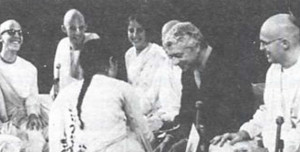 Jayadvaita: But where do they get it?
Jayadvaita: But where do they get it?
Rupanuga: It’s coming from the sun. The sun’s coming from Krsna. It’s all coming from Krsna. Everything is emanating from Krsna. So all we’re doing … One little trick we’ve learned to be happy: that we accept, joyfully we accept, because it’s Krsna’s mercy. But we give back. Because it’s His.
Yogesvara: That’s a very interesting example that you just gave when you said that this light is coming from Con Edison. That’s the point of this movement—to change the vision that people have from one of material consciousness, or consciousness of simply what their senses are dictating to them, to one which is tempered by knowledge coming down through the line of teachers, of spiritual masters.
Mr. Susskind: I did that research about your movement, and it said that after you got permission to marry, you do in fact marry, and there’s a kind of lovely ceremony that goes on. Then you don’t need permission to have children, but your sexual activities are pre-ordained by this Krsna consciousness.
Rupanuga: It’s called family planning. We plan to have children, not to avoid having children. We want to have children so that we can raise them in Krsna’s service.
Mr. Susskind: But when you have children you have to precede it by five hours of chanting?
Rupanuga: We’re always chanting. Like today, we preceded the show by several hours of chanting before we came here.
Mr. Susskind: But five hours of singing …
Jayadvaita: Not singing. On beads. You can chant any way. There are no hard and fast rules for chanting. But by chanting for that time, what are you thinking of? Krsna, Krsna, Krsna.
Mr. Susskind: Shouldn’t you be thinking of Miriam, Miriam, Miriam?
Jayadvaita: No.
Bhagavan: It’s not that chanting is labor.
Mr. Susskind: Does Miriam or Martha ever take over from Krsna?
Rupanuga: Wait, wait, let’s talk about Miriam for a second. Everybody in the world is very much after sex life because sex life is the highest pleasure in the material world.
Mr. Susskind: Well, it’s a contender.
Rupanuga: Until we get too old. It’s a very nice pleasure. Now, the thing is that everyone has plenty of that. Everyone has plenty of sex life, yet no one’s happy.
Mr. Susskind: Wait a minute. You can’t make categorical statements like that.
Rupanuga: All right, then what is happiness?
Mr. Susskind: What do you mean no one’s happy?
Rupanuga: What is happiness?
Mr. Susskind: Happiness is a condition of fulfillment or self-realization or pleasure, a feeling …
Satsvarupa: That never ends.
Mr. Susskind: … of happiness, of ecstasy …
Rupanuga: But no come down.
Mr. Susskind: Oh, sure you come down from that.
Rupanuga: Oh, no.
Whole panel: No, no.
Jayadvaita: That’s not happiness.
Yogesvara: Happiness is eternal.
Rupanuga: That’s because it’s a different high. We’re talking about a spiritual high. You should stay high forever, but you just must chant.
Mr. Susskind: Does your wife never say, “Knock off the chanting and love me?”
Rupanuga: She says, “Chant if you love me.”
Mr. Susskind: Chant if you love me. Right. Is there a limit on the family that you can have? Can you have as many children as you want?
Satsvarupa: The limit is that no one should have a child unless he can raise the child to be free from death. We’re all heading for death. Maybe in a moment or maybe ten years. But if you can raise your children and yourself to be free of death—this is actually possible by love of God.
Mr. Susskind: All right. Now the people are crossing the streets in Chicago, in Pittsburgh, Detroit, L.A., San Francisco, and they see you. What would you like them to think? Because they think it’s a very strange sight. I mean I’ve passed you in New York and wondered, “What the devil are they doing?”
Rupanuga: Well, we want them to stop speculating on us and ask us what we’re doing. That’s our whole business.
Mr. Susskind: And then they say, maybe you’re cop-outs.
Rupanuga: But we’re actually not. We’re drop-ins. We’re back in! We’re really in. This Hare Krsna movement is the in thing [laughter], and we’re simply asking that every intelligent person take a look at what we’re saying. Not that they say, “Oh, they’re chanting Hare Krsna.” But what’s behind it?


Leave a Reply